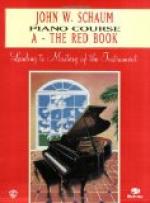It means much to have a native-born teacher of such high aims living and working among us; a teacher whom no flattery nor love of gain can influence nor render indifferent to the high aim ever in view. There is no escaping a sound and thorough course of study for those who come under Mr. Lambert’s supervision. Scales must be, willingly or unwillingly, the daily bread of the player; the hand must be put in good shape, the finger joints rendered firm, the arms and body supple, before pieces are thought of. Technical study must continue along the whole course, hand in hand with piece playing; technic for its own sake, outside the playing of compositions. And why not? Is the technic of an art ever quite finished? Can it ever be laid away on the shelf and considered complete? Must it not always be kept in working order?
“Have you not seen many changes in the aims of students, and in the conditions of piano teaching in New York, during the years you have taught here?” I asked Mr. Lambert, in the course of a recent conversation.
“Some changes, it is true, I have seen,” he answered; “but I must also say that the conditions attending piano teaching in America are peculiar. We have some excellent teachers here, teachers who can hold their own anywhere, and are capable of producing finished artists. Yet let a pupil go to the best teacher in this country, and the chances are that he or she is still looking forward to ‘finishing’ with some European artist. They are not satisfied until they have secured the foreign stamp of approval. While this is true of the advanced pianist, it is even more in evidence in the mediocre player. He, too, is dreaming of the ‘superior advantages,’ as he calls them, of European study. He may have no foundation to build upon—may not even be able to play a scale correctly, but still thinks he must go abroad!
“You ask if I think students can obtain just as good instruction here as in Europe? That is a little difficult to answer off-hand. I fully believe we have some teachers in America as able as any on the other side; in some ways they are better. For one thing they are morally better—I repeat, morally better. For another they are more thorough: they take more interest in their pupils and will do more for them. When such a teacher is found, he certainly deserves the deep respect and gratitude of the American student. But alas, he seldom experiences the gratitude. After he has done everything for the pupil—fashioned him into a well-equipped artist, the student is apt to say: ’Now I will go abroad for lessons with this or that famous European master!’ What is the result? He may never amount to anything—may never be heard of afterward. On the other hand, I have pupils coming to me, who have been years with some of the greatest foreign masters, yet who are full of faults of all kinds, faults which it takes me years to correct. Some of them come with hard touch, with tense position and condition of arms and body, with faulty pedaling, and with a lack of knowledge of some of the fundamental principles of piano playing.




